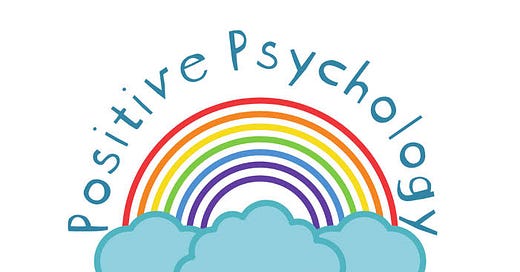Life can often feel like a rollercoaster, with ups and downs that can leave us feeling worried, frustrated, and even a little lost. Fear not, though; you may navigate these twists and turns with the help of the interesting discipline of psychology known as positive psychology, which promotes resilience, happiness, and general well-being. Let's go on a journey to explore this interesting topic today!
What is Positive Psychology?
Positive Psychology is all about focusing on the positive aspects of life rather than just treating mental health issues. It aims to understand and cultivate the factors that lead to a fulfilling and meaningful life. As the great American psychologist Martin Seligman puts it, "Positive psychology is not about eliminating suffering; it is about increasing human strengths."
The Pursuit of Happiness
One of the primary goals of Positive Psychology is the pursuit of happiness. But what exactly is happiness? "Happiness is not something ready-made. It comes from your own actions." It's a state of well-being that encompasses feelings of joy, contentment, and satisfaction.
Fostering Resilience
Being resilient means having the capacity to overcome challenges. Resilience helps you maintain your composure in the face of anything life throws at you. You may experience numerous setbacks, but you shouldn't allow them to make you give up. Positive Psychology teaches us how to develop this resilience, allowing us to face challenges with grace and strength.
As Maya Angelou once said, "You may encounter many defeats, but you must not be defeated."
Now, let's dive into some practical ways to incorporate Positive Psychology into your life:
1. Gratitude Journaling: Gratitude journaling is the habit of recording and reflecting on things (typically three) that you are grateful for on a regular basis. In essence, you are rewiring your brain to focus more on the positive aspects of your life and build resilience against negative situations. Keeping a gratitude journal is a popular practice in positive psychology, the scientific study of happiness. It’s commonly also referred to as “counting your blessings” or “three good things.”
2. Mindfulness and Meditation: Mindfulness is the basic human ability to be fully present, aware of where we are and what we’re doing, and not overly reactive or overwhelmed by what’s going on around us. While mindfulness is something we all naturally possess, it’s more readily available to us when we practice it on a daily basis. Meditation is exploration. It’s not a fixed destination. Your head doesn’t become vacuumed free of thought and utterly undistracted. It’s a special place where each and every moment is momentous. When we meditate, we venture into the workings of our minds: our sensations, emotions, and thoughts.
3. Cultivate Positive Relationships: We all need friends and people who care about us. We need people who will listen when we’re upset or sad. We need people who can help us through tough times. And we need people who are there to celebrate with us in good times too. Good relationships help us live longer, healthier lives. They make life better. They give us support when we need it most. They provide comfort and strength and make our lives more enjoyable.
4. Acts of Kindness: Helping others can be good for our mental health. It reduces stress, improves our emotional well-being, and even benefits our physical health. In short, doing good does you good. It’s essential to look out for each other in and around our communities. This is how we protect and maintain good mental health for all. If you do nothing else today, keep an eye out for an opportunity to help someone with a random act of kindness or hold onto that warm feeling when someone helps you.
5. Pursue Your Passions: The interesting thing about pursuing your passions is that doing something you care about on an emotional and intellectual level will result in you wanting to do more of it. For this reason, you must find your passion if you’re eager to lead a fulfilling life.
Remember, it's okay not to be okay sometimes.
Positive Psychology doesn't mean ignoring negative emotions or pretending everything is fine when it's not. It's about acknowledging and working through challenges while actively cultivating the positive aspects of your life. The choice to lead a happier life is yours, and Positive Psychology can be your guide on this exciting journey.
As the great Abraham Lincoln once said, "Folks are usually about as happy as they make their minds up to be."
Thank you for reading. If you have any topic you want me to discuss, you can reply to this newsletter. Don’t forget to share it with your friends and family if you find it beneficial.
See you. Ciao!



